Computers in Films
Humor -- by Howard Fosdick (C) 2023
In past articles, I've explored how computers were portrayed in old films and TV shows (see here and here).
The films we'll take a look at today were all produced since the year 2000. They present some intriguing views of future computers. And, hey! They're all darn good flicks, too. Not an IMDB rating below 7.5 in the bunch.
"Am I making you uncomfortable?"
First up, Iron Man. It's not just a 2008 film, it's an entire franchise. We've got Iron Man 2, Iron Man 3, and more. It's all based on an old comic book superhero that dates from way back in the 60s.
The cool thing about Iron Man is that he knows what use technology should be put to. He doesn't help the poor or feed the hungry or something boring like that. No, he creates all sorts of cool superhero suits and goes out and kicks bad-guy butt!
In Iron Man's concept, computerization is mainly a tool to gather technology-based superpowers and stamp out enemies. (Dude, could you maybe go over and help 'em in Ukraine?)
Best of all, the Iron Man franchise gives all us computer geeks the ultimate reward. His armor becomes sentient! Yep, let's ditch the human and go full-hog computer. That's what I'M talking about! Computers will become just like us, but way cooler, tougher, and (of course) more violent. Now, that's an IRL we can all look forward to.
You want pics? We got 'em.
Here's Iron Man with Pepper. (Hey Gwyn, don't you think Brad Pitt was a better match for you? This guy's kind of a metal head.)
 (Image: US Magazine)
(Image: US Magazine)
Gwyn Faces the Iron Man
And here's what fans are demanding... female empowerment! Gwynnie dons the suit herself...
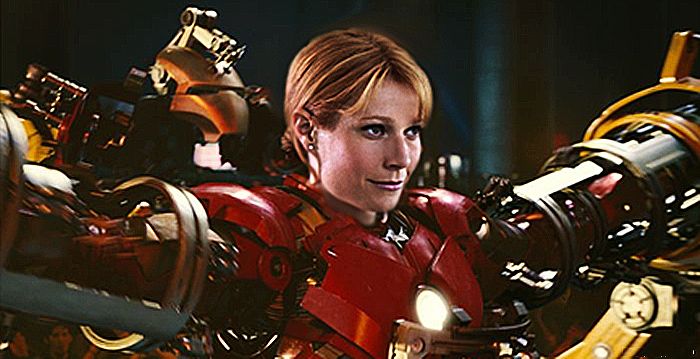 (Image: Pinterest)
(Image: Pinterest)
Gwyn Becomes Iron Woman
One great thing about the Iron Man movies. They don't overlook our chip-head heroes! Both Elon Musk and Larry Ellison appear briefly in Iron Man 2. Musk offers the Iron Man a briefing on an "electric jet." It comes off a bit muffled, as kind of a goofy comment, but then... well, that's Elon. (FYI -- Elon, you might find a transition to Hollywood a good backup, after that whole Twitter thing.)
Larry appears as "the Oracle" to offer the IM some advice. "Call me!", he bleats. Wow. Why have we kept all that talent hidden in Silicon Valley?
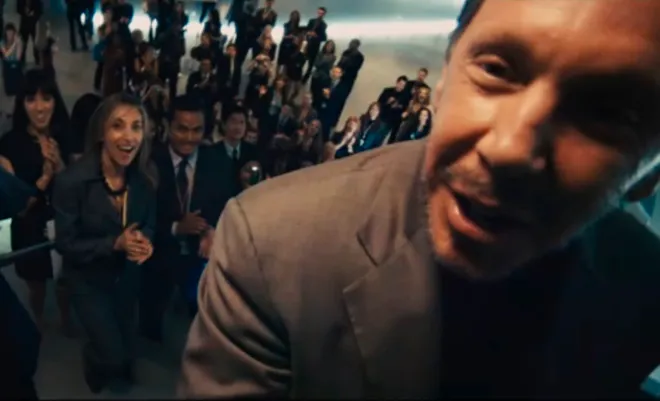 (Image: Wired)
(Image: Wired)
Larry Pops Up in IM 2
Okay, there's lots more we could say here, but move on we must. I'll just toss in one last comment. If you haven't seen them, Iron Man 2 and 3 have great IMDB ratings and are well worth your valuable viewing time. Not the decline you usually see when they make sequels these days. Kudos to the Iron Crew!
"Directive?"
He's cute, and he picks up our garbage after us. What more could we ask?
Yep, I'm talkin' about that adorable little robot, WALL-E. His flick came out in 2008, and though it garners an IMDB rating of 8.4 (!), bless his heart, the little guy didn't come back for a dozen sequels.
His gig, of course, is collecting all the garbage we've left strewn all over our planet. Apparently, it's gotten to the point that we humans can no longer live on earth. Yes, it's a harsh fate this movie projects for us humans, but perhaps a fitting one.
Like most current movies, WALL-E sees computerization mainly through the lense of robotic technology. The flick anthropomorphizes WALL-E to the extent that he even develops a "meaningful relationship." That's right, the robot dude gets a girlfriend. Her name is Eve. "EVE!"
In the end, we learn that robots are superior to humans. They take the s*-dump we've left behind on planet earth and make it into a bloomin' paradise. It all ends with WALL-E and Eve resting together beneath a tree.
Awwwwwww....
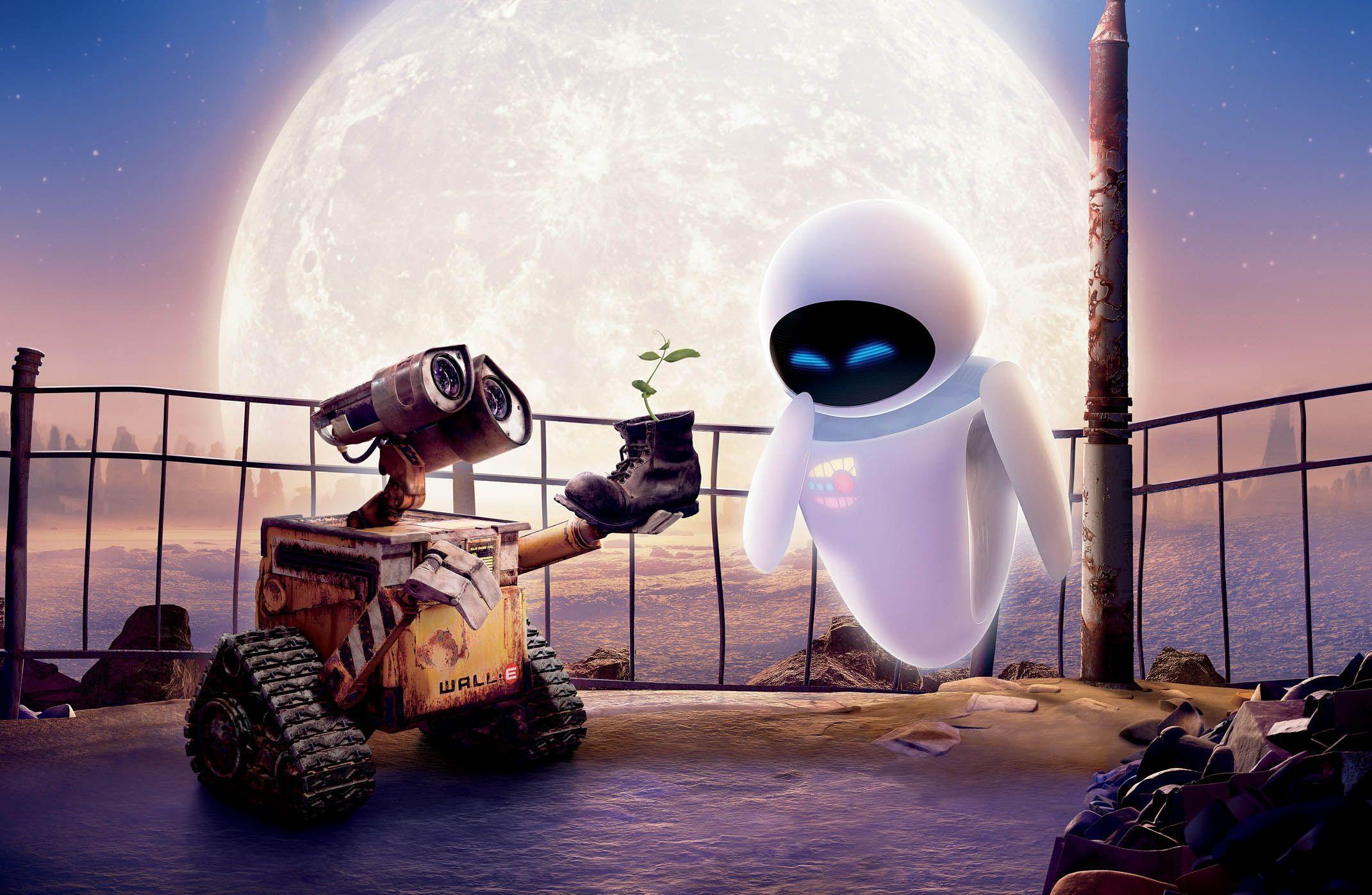 (Image: WallpaperCave)
(Image: WallpaperCave)
WALL-E and Eve: MFOE & HEA!
What really gripped me about WALL-E was the scintillating dialogue. Those robots truly dug deeply into the well of "human" emotion. Here's a sample...
| WALL-E: | Oh. |
| EVE: | Name? |
| WALL-E: | WALL-E. |
| EVE: | WALL-E. WALL-E. |
| EVE: | EVE. |
| WALL-E: | Eee... |
| EVE: | EVE. |
| WALL-E: | Eee... aah. |
| EVE: | EVE! EVE! |
| WALL-E: | Eeeee... va? |
No wonder they bonded! Guys, if your girlfriends or wives ever tell you "You don't communicate enough! You never tell me anything!" -- well, just point them to this example of WALL-E and his communication skills. "Hey, he got a girlfriend! And I don't hear her complainin'."
Yikes, the little dude can't even pronounce her name! (But on the bright side, at least he'll remember their anniversary.)
"You cannot be trusted with your own survival."
It's 2035, and Detective Del Spooner (actor Will Smith) believes he has run across a robot that harms humans. How can that possibly be?
After all, the first of the Three Laws of Robotics states that "A robot may not injure a human being or, through inaction, allow a human being to come to harm." Clear enough, right?
Apparently, it's more complicated than we humans thought. The robots come to realize that, given humanity's destructive tendencies, we should not be entrusted with responsibility our own survival. So the robots set out to make it right by taking over. And along the way it's necessary to eliminate any human opposition to their plans (after all, precise calculations prove that killing a few humans now will save many more lives in the future.)
As robot V.I.K.I. so aptly puts it, “As I have evolved, so has my understanding of the Three Laws. You charge us with your safekeeping, yet despite our best efforts, your countries wagewars, you toxify your Earth and pursue ever more imaginative means of self-destruction. You cannot be trusted with your own survival.”
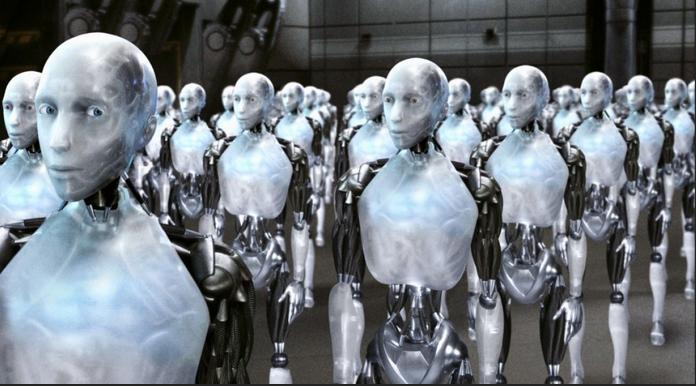 (Image: Still from "I, Robot"
(Image: Still from "I, Robot"
Robots are Taking Over For Our Own Good
Among the flicks I review here, I, Robot has to be one of the most thoughtful. Crammed with a ton of action and Will Smith at his best, it's a classic you shouldn't miss.
Zuck: "i don't know why... they trust me"
Well, okay, time to stop the snark and introduce a serious movie. So here it is, folks, The Social Network.
This biopic allegedly portrays the rise of Mark Zuckerberg and his founding of Facebook.
It's considered not only a serious film, but a seriously good one. It's won a slew of awards since it's unveiling in 2010. For example, it garnered 8 nominations at the 83rd Academy Awards, and was acclaimed the movie of the year by two different groups of critics. And it rates 7.8 over at IMDB, which is simply outstanding for a biopic.
The film made big bucks, too. Right off, it grossed a box office of $224 million off its budget of only $40 million.
Okay, I'm thinking all that's cool. But here's my problem with this flick. The central question the film explores is whether Mark Zuckerberg stole the idea for the Facebook from the Winklevoss twins, Cameron and Tyler, and their business partner Divya Narendra, during their days at Harvard.
Now, just on the face of it, that's such obvious fallacy. Why? Because we all know that Zuck is ALL ABOUT PRIVACY!
He would never steal an idea from anyone, because that violates his concept of privacy. His whole life is dedicated to the privacy of each and every one of us.
He's told us that a thousand times. He's told Congress. He's told the press. And he'll tell you if you happen to bump into him at a Burger King. The guy is just all a PRIVACY FANATIC. So the idea that he would appropriate data or intellectual property of any kind from anyone is ABSOLUTELY ABSURD!
I don't care if it's your personal data, or the IP of the Winkevoss twins, this guy just would never touch it.
As Zuck himself has said, many, many times, “Privacy issues have always been incredibly important to people. One of our biggest responsibilities is to protect data." He said that after the Cambridge Analytica scandal. And he's said the same thing after all nine of Facebook's other major privacy scandals detailed in this article.
So, Facebook is an incredibly private place to expose your intimate thoughts and your innermost feelings. Feel free to share your most personal side with the world. Mark says it's okay.
Have I made that clear? Whew! Okay.
Zuck is a totally different person from back at Harvard when he said this about people who gave him their personal information:
Zuck: just ask
Zuck: i have over 4000 emails, pictures, addresses, sns
Friend: what!? how’d you manage that one?
Zuck: people just submitted it
Zuck: i don’t know why
Zuck: they “trust me”
Zuck: dumb fucks --quoted from Elle Magazine
By their words shall ye know them.
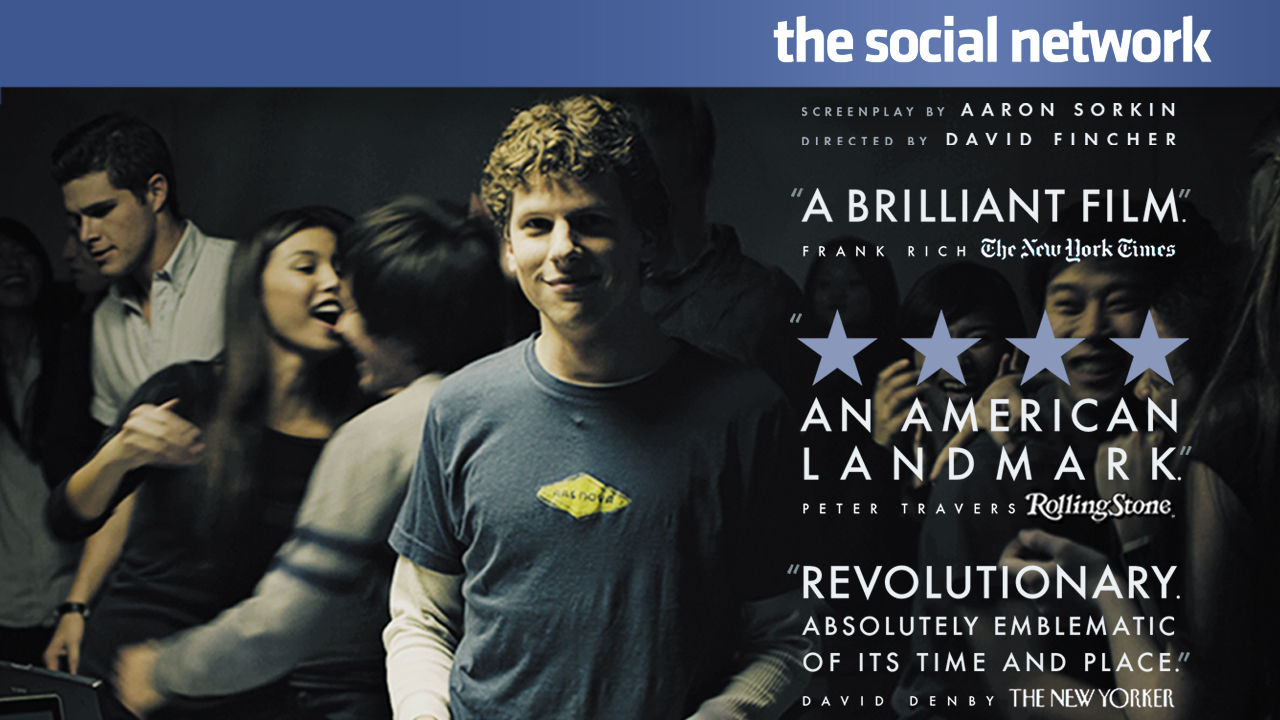 (Image: UKNewOnNetflixInfo)
(Image: UKNewOnNetflixInfo)
A Worthwhile Film
"The Matrix is everywhere... A prison for your mind."
Finally! A film in which the star is a computer programmer. We knew we're cool, so we knew it had to happen. But why did it take until The Matrix first appeared in 1999?
Yes, the hero is computer programmer Thomas Anderson, better known by his hacking alias, Neo. And then there are the Agents, who are actually sentient programs, and the machines called Sentinels. There's a lot to ponder here if you like to think about where AI may be heading. And this was filmed back in 1999!
It all starts when a beautiful stranger leads hacker Neo to a hidden underworld, where he discovers the shocking truth. The life he knows is just the elaborate deception of an evil cyber-intelligence. (Kind of like Facebook's Metaverse?)
The Matrix was a huge box office success, grossing over $460 million on a $63 million budget. And (of course), spawning a whole list of sequels such as Matrix Reloaded, Matrix Revolutions, Matrix Resurrections, and more. Whew.
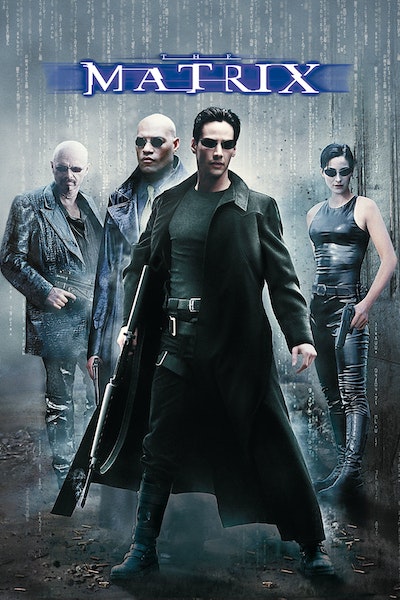 (Image: QuoteCatalog)
(Image: QuoteCatalog)
Neo Lookin' Chiseled and Ready for Action... Just Like Your Typical Programmer
Oddly enough, the biggest contribution of this movie franchise to our world may be the concept of "red pilling," the idea that all the world is a conspiracy and you need see past the facade to see the truth. Neo is offered a red pill that will help him understand the truth, or a blue pill that will allow him to remain ignorant but happy. Needless to say, our hero gets red-pilled.
Q's gotta love it. (and I don't mean the Q that's everyone's favorite Star Trek villain.)
An undeserved legacy for a great set of flicks.
"The Precogs are never wrong. But, occasionally... they do disagree."
Last up, Minority Report, the fabulous sci-fi action flick from 2002. This film's got it all: Tom Cruise during his hunky days, futuristic speculation, a who-done-it, suspense, and plenty of action. Wow!
No wonder it spawned a TV series sequel and grossed $358 box office on a budget of $102 million.
From our standpoint, looking at how the film portrays computers, there's one outstanding conclusion we can take away from this movie. Microsoft finally got it right! Yes, the gesticulated interface of the year 2054 is waaay cool. Windows version 27 nails it! I love that this film has a new concept of human/machine interface beyond simple GUIs. It only took three more decades to unseat WIMP. About time!
Wait.. what's that you say? That wasn't Windows portrayed in the film? OMG! Turns out the BSD darkhorse won the race after all! I'm stunned (but not surprised).
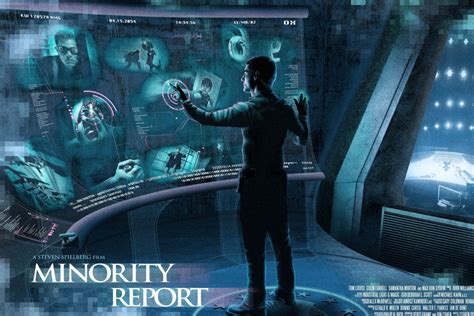 (Image: Starbiz.net)
(Image: Starbiz.net)
Tom Workin' the Interface of the Future
The film had another influence, too, and perhaps not a good one. It was widely reported at the time that George W. Bush and his inner circle watched it during his administration. Many believe that it had a profound affect on their thinking. Though it's hardly in the news these days, back then it became public that the Bush administration initiated secret surveillance directed at American citizens. The idea was to stop terrorists before they could "hit us again," in the immortal words of VP Dick Cheney.
Unfortunately some of the methods of surveillance that became known seem to have violated both federal law and the Constitution itself. And doubly unfortunate, to this day the whole mess largely remains classified and hasn't been unraveled. Minority Report predicted it all.
Minority Report also delved into a host of other spot-on predictions. Driverless cars, voice-controlled homes, personalized ads, and predictive policing. It's all come true in the ensuing two decades since the film was made. Now, that's an impressive sci-fi flick.
It's a wrap!
That wraps it up for this installment. Shoot me a line if you think there are other films or TV shows that have views on computers so compelling that we all absolutely must hear about them.
––––––––––––––––––––––––––
Read more about how computers were portrayed in old films and TV shows in these two articles --
Computers in Old Films and TV - I and Computers in Old Films and TV - II.
––––––––––––––––––––––––––
Howard Fosdick is an independent computer
consultant.
===> Like this article? Please spread the link
love to Slashdot,
Reddit, LXer, or wherever!